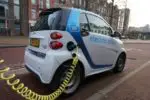Have you noticed more electric cars on the roads in Alberta lately? You’re not imagining things. Over the past year, the number of Alberta’s registered electric cars has increased by approximately 80 per cent. It’s a significant jump that has pushed the number of electric vehicles on Alberta’s roads above 1,000, pushing Alberta into a fourth-place ranking for its electric car fleet, right behind Quebec, Ontario, and British Columbia.
Why is the popularity of electric cars on the rise in a province that is built on its oil and gas industry?
Part of the reason involved the oil and gas industry itself. In the wake of the oil-price-fueled economic recession, many of the oil and gas companies began looking for ways to diversify and, as a result, stabilize and strengthen. While some began focusing on exports and international development, others have begun to incorporate green energy solutions into their business plan. Others, including Atco Ltd., turned specifically to the electric car industry, investing in the development of charging stations across Calgary, Red Deer, and east of Edmonton (for starters).
With charge stations becoming more accessible—and as many car manufacturers begin to innovate more and more in order to offer more models with improved technologies at decreased costs—the biggest hurdles to those who are interested in getting into the market for an electric car are quickly diminishing.
Does this mean you should start shopping for an electric car?
The choice is up to you and is largely based on your location and lifestyle. Here are a few of the pros and cons that could help you make the big decision.
Pros:
1) You don’t have to compromise on speed or style
Technological innovations have improved the look and function of electric cars vastly from the first electric cars that were produced. You aren’t sacrificing any speed or performance capabilities, either. The high-torque axle-twisting power offered by electric cars delivers power immediately to the wheels—and it’s silent.
2) Save the environment one electric car at a time
Electric cars have no tailpipe emissions, and that means improved air quality and decreased contributions to climate change. Now technology is even introducing solar recharge options both at home and at charge stations on the road, so your overall dependence on the energy forms that are damaging the environment will steadily decrease.
3) Cost efficient
No exhaust systems means no oil changes—your maintenance costs are reduced overall, and that’s in addition to the money you’ll save by using non-petroleum energy options to power your vehicle.
4) Incentives
Some provinces offer incentives to help counterbalance the higher upfront costs of going electric.
Cons:
1) Range anxiety
Technology hasn’t quite caught up to long-distance requirements yet. Most electric cars have an 80-100 mile range, and they take longer to “refuel” or recharge. This is changing rapidly as technology improves, though.
2) The pricier option
Electric cars are still considerably more expensive than gas-powered vehicles. The higher costs you’ll pay upfront will balance out over time when you combine the costs you save with cheaper refueling and the lower maintenance requirements, but you’ll still need to decide if those long-term savings justify the higher upfront costs.
3) Options
Technology is improving every day, which means the look and style of the electric car is changing, too, but you still have limitations when it comes to your model options right now.
Visit us at energyrates.ca to learn about other ways to lower the amount you pay for energy.












